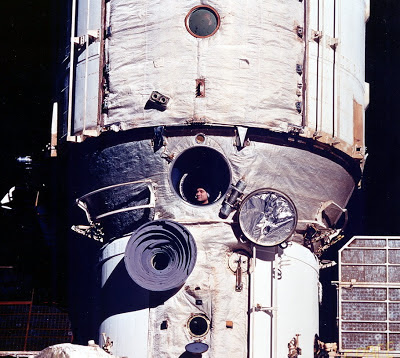While we're on the subject of so much fascinating news from Russia, it reminded me of a recent conversation I had with another space enthusiast; it was rather embarrassing when neither of us could recall the Russian gent who clocked the most time in space on a single mission. It was right on the tip of our middle-aged tongues, but we came up short!
Interesting how we remember the FIRST guy in space, the FIRST on the Moon... but even astronaut groupies draw blanks at the continually changing record holders for spacewalks, multiple missions, and so on. This week's events reminded me, and I thought this cosmonaut was worth highlighting.
Валерий Владимирович Поляков
The researcher and "Doctor Cosmonaut" of the Tula Oblast, Valeri Vladimirovich, was born with the surname Korshunov, but as a teen, changed his name to Polyakov when his step-father adopted him. A graduate of the Moscow Medical Institute, he specialized in astronautics medicine at the Institute of Medical and Biological Problems (IMBP - chaps who just did the Mars500!) and was selected by the Soviet Space Program as a cosmonaut in the IMBP-1 group in 1972.
From August 1988 to April 1989, Valeri Polyakov worked on the Mir Space Station for missions EO3 and EO4, clocking 241 days. Interestingly, part of his job as flight surgeon was to determine how long-duration spaceflight affected the human body. He would certainly get to know that better than anyone, first hand!
Years later, he returned to Mir, and stayed in orbit for more than 14 months, between January 1994 and March 1995! Wow. His series of missions spanned Mir EO15, 16 and 17. He orbited planet Earth 7,075 times and traveled 186,887,000 miles.
Across his two extended missions, he spent over 678 days in space. His records for overall time in space and greatest speed in space were both later overtaken by other cosmonauts, Sergei Krikalev and Sergei Avdeyev, but today, Valeri still holds the record for the most consecutive days in space at 437 days!
Polyakov retired from the cosmonaut corps in 1995 and returned to his assignment (begun in 1989) as Deputy Director of IMBP until 1997, when he became a professor at International Academy of Astronautics. He is currently the Deputy Director of the Ministry of Public Health in Moscow, where he oversees the medical aspects of long-duration space missions. And who better?
He tends to offer pretty replies in official interviews, insisting that his safe and healthy return from space shows that "it is possible to preserve your physical and psychological health throughout a mission similar in length to a flight to Mars and back." (NY Times, 2009).
However, data collected from the Mars500 would seem to suggest otherwise. If anything, time spans of over a year are easily proving that even carefully selected, high-performance and motivated crews put into isolation are prone to sleep disturbances, episodic depression, and culturally-driven behavioral challenges.
Many myths follow this record-breaker, largely because he is seen in public very rarely, and when he is filmed for space documentaries (filmmaker Dana Ranga referred to him as "fragile") for sessions for the RFSA these days (such as his congratulatory video to the Mars500 crew), he is always sitting.
In the precious few instances where he is photographed standing, has he been propped up? Can he walk? Is he crippled? Why does he not stride to podiums at state events of museum openings like Tereshkova, or other fellow cosmonauts of the Mir era?
Why won't Roskosmos make public his 50-some-odd medical publications, based on his experiments in space? What did long duration spaceflight truly to do this man's body and mind, and why is data on that subject so very hard to find?
I hate to leave any blog article hanging on a question mark, but when the it comes to Polyakov, question marks are all I am left with! And we may not know the truth until he passes away...





































































